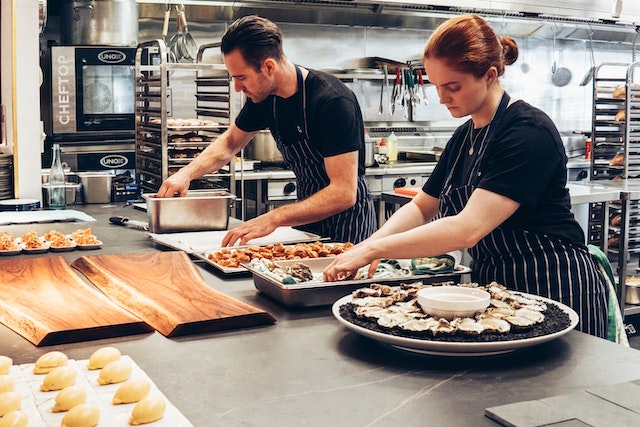Working in the restaurant industry can be incredibly rewarding, but it can also be incredibly challenging, especially during those hectic shifts where everything seems to go wrong. From being short-staffed to unexpected large groups of diners, a busy shift can quickly become overwhelming.
However, with the right strategies and preparation, you can turn the chaos into a successful service. In this article, we’ll explore various tactics and techniques for managing a busy restaurant shift and ensuring that you and your team can handle anything that comes your way. So, whether you’re a server, bartender, or chef, let’s dive in and discover how to survive the rush.
Pre-Shift Preparation
Surviving a busy restaurant shift requires more than just physical stamina – it also requires mental preparation and strategic planning. In this section, we’ll discuss the importance of pre-shift preparation and provide tips for how to prioritize tasks before the rush hits. Arriving early to set up for the shift is crucial for ensuring that everything is in place and ready to go when the doors open. This includes checking inventory levels, restocking supplies, and making sure all equipment is in working order.
Prioritizing tasks is key to ensuring a smooth shift. This involves making a list of all the necessary tasks that need to be completed before the shift begins, such as prepping food, setting tables, and cleaning the dining area. By prioritizing tasks, you can ensure that the most important ones are completed first, so that when the rush hits, you can focus on serving customers rather than scrambling to get everything done.
Finally, mental preparation is also crucial for surviving a busy shift. Taking a few minutes to mentally prepare yourself for the upcoming rush can help you stay focused and calm when things get hectic. Some strategies for mental preparation include taking deep breaths, visualizing a successful shift, and reviewing the menu and specials to ensure you’re prepared to answer any questions that may arise.
Communication and Coordination
The key to successfully handling a busy restaurant shift is effective communication and coordination. Before the shift starts, make sure you have a clear understanding of your role and responsibilities, as well as those of your coworkers. Effective communication with both management and coworkers is crucial for ensuring that everyone is on the same page and able to work together smoothly.
During the rush, it’s important to communicate effectively with other servers and kitchen staff to avoid confusion or delays. This may involve calling out orders, delegating tasks, or asking for assistance when needed. Remember to remain calm and professional, even when things get hectic.
If conflicts or issues do arise, it’s important to handle them quickly and respectfully. Avoid letting personal feelings or emotions get in the way of effective communication and problem-solving. Instead, focus on finding a solution that works for everyone involved, and be willing to compromise when necessary.
Effective communication and coordination are essential not only for handling a busy restaurant shift, but for creating a positive and productive work environment overall. By prioritizing these skills, you can help ensure that everyone on the team is able to work together effectively and efficiently.
Time Management
One of the biggest challenges of a busy restaurant shift is managing time effectively. With a constant stream of customers and tasks to complete, it’s easy to feel overwhelmed and lose track of time. However, with proper time management strategies, you can stay organized and efficient, even during the busiest rushes.
- One effective strategy is to prioritize tasks based on their level of urgency. For example, if you have a table that’s been waiting for their food for a while, it’s important to check on them and communicate with the kitchen staff to ensure their food is prepared as quickly as possible. On the other hand, restocking napkins or refilling salt shakers can wait until you have a spare moment.
- Another important aspect of time management is staying organized. This means keeping your section clean and tidy, making sure your orders are accurately recorded and sent to the kitchen in a timely manner, and keeping track of multiple tasks at once. One helpful tool for staying organized is to use a notepad or smartphone app to make to-do lists and set reminders for important tasks.
Of course, unexpected challenges can arise during a busy shift, such as a sudden rush of customers or a delay in the kitchen. In these situations, it’s important to stay calm and focused, and to communicate effectively with your coworkers and management to find a solution.
Self-Care and Stress Management
It is essential to prioritize self-care during a busy shift to prevent burnout and ensure a successful shift. This section will cover strategies for managing stress and staying calm under pressure, as well as tips for staying energized and focused throughout the shift.
- One of the most important things to remember is to stay hydrated and fuel your body with healthy food. It can be tempting to reach for a quick snack or energy drink during a busy shift, but these options can lead to a crash later on. Instead, prepare nutritious dishes like arroz con leche or similar ones and bring a reusable water bottle to stay hydrated throughout the shift. Find the recipe for that dish here: https://mahatmarice.com/recipes/arroz-con-leche/.
- Another important aspect of self-care is managing stress. When the rush hits, it’s easy to feel overwhelmed and stressed. One strategy for managing stress is to practice deep breathing exercises or mindfulness meditation. Taking a moment to step back and focus on your breath can help calm the mind and lower stress levels.
- Staying calm under pressure is another key skill for surviving a busy restaurant shift. One way to do this is to prioritize tasks and work efficiently, focusing on one task at a time instead of trying to multitask. Additionally, taking breaks when possible, such as stepping outside for some fresh air or taking a quick stretch break, can help clear the mind and improve focus.
Finally, it’s important to stay energized and focused throughout the shift. Getting enough sleep the night before a shift and eating a balanced breakfast can help provide sustained energy throughout the day. Additionally, staying positive and focused on the task at hand can help maintain motivation and productivity.

